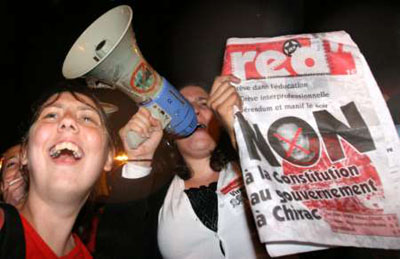Democrat June-July 2002 (Number 63)
Convention to write
an EU Superstate Constitution

The summit which launched the Nice Treaty in December 2000 also put in place arrangements to form a committee called a Convention. This is to ostensibly write a constitution for the EU "meaningful to the ordinary person" for another Treaty in 2004. The committee made up of representatives of member states and the so called European Parliament has been called a Convention to give the impression the process follows the Philadelphia Convention founding the USA.
Former French President and Eurofile, Valery Giscard d'Estaing, is president of the Convention and reported to the recent Seville EU summit in June.
Useless
Organisations can put points of view to the Convention - on one side of a piece of paper! Eurosceptic views find it nearly impossible to meet the rigid brief allowed. In other words it is virtually a waste of time being critical or trying to reform from within the growing EU superstate.
Transnational proposals
On the other hand Europe's biggest transnational corporations have no difficulties in putting across their latest demands to centralise even more powers to the European Commission and Commission President Romano Prodi. EUROPE'S biggest transnational corporations have launched new demands to centralise even more powers to Commission President Romano Prodi's European Commission.
ERT backs Commission
After drawing up plans for the single market, benchmarking and the euro, the European Round Table of Industrialists (ERT) have backed the Commission against complaints from member states that the relentless centralisation of power to faceless eurocrats must end. ERT members - including the heads of Shell, Siemens, Thyssen, Krupp, Nestle and a host of others - told the "Convention" on the future of Europe, headed by Valery Giscard d'Estaing, that the EU was their project and it did not want any powers going to national governments.
"As big multinationals, we have thrown our lot in with European development and creating European business structures and we feel criticisms against the Commission are damaging," ERT member Morris Tabaksblat told the Financial Times on June 26.
Powerful Commission
In short, the elite group supports Germany and the construction of a very powerful Commission in a Federal Europe in order to protect their considerable interests. Tabaksblat said corporate capital fears a drift to "renationalise" Commission competences in any discussions within the convention. "We believe the Commission should be strengthened in the economic field," he said.
He also complained that the Lisbon agenda of mass privatisation pushed by Blair two years ago has not moved forward: "Everything has stalled." The big business lobby also endorses recent proposals by Prodi to "streamline" the Commission and the creation of an inner cabinet to impose its will on the rest. "A college of 27 Commissioners or even more could result in cumbersome decision-making, ineffectivenes and infighting," he said. The ERT reveal the core inspiration of the federalists dream, the removal of democracy in Europe which is to be sacrificed on the alter of profit for the mega corporations.
Agreements at Seville
Agreement was reached at the summit to cut the number of Council of Ministers - these roughly cover cabinet portfolios such as transport, agriculture, finance, fishing, justice, home affairs and so on. The amount of time the summits take is also to be reduced to one day and in the future they will be held only in Brussels. The object is in line with the ERT's proposals for concentration of yet more power in the Commission and bureaucratic structure and hence away from national governments and parliaments.
Most decisions are already taken by COREPER the permanent committee of civil servants delegated by member states. Their decisions are passed on to the relevant Council of Ministers for rubber stamping or further discussion. If the Ministers cannot agree the arguments are taken to the EU summit and hence the endless rows and unseemly horsetrading.
All these decisions are taken behind closed doors and most by majority votes with the larger states having disproportionately more votes than smaller member states. Despite all this, the national question and national interests still ram through shaking the EU to its very core. Even though plenty of votes are taken within the EU institutions and various bodies, the EU is not democratic and cannot ever be. Democracy can only function within nation states and not between them.
Opposition to EU
Despite the formation of this so called Convention to distract and deflect criticism of the EU, opposition to the EU is growing across the continent. We in Britain can have our say and play an important part by rejecting the single currency and Brussels Directives like those laying down the privatisation of the railways, Post Office and disassembling the public sector with PFI and PPP schemes.